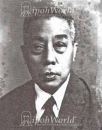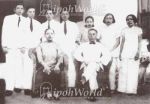We've tried to ensure the information displayed here is as accurate as possible. Should there be any inaccuracies, we would be grateful if you could let us know at info@ipohworld.org . All images and content are copyright.
(Please click on the thumbnail for a bigger image.)
The Ho's Of Batu Gajah - Ho Yuk Phooi And Family


Arriving in Malaya in 1893 with his mother, Kwok Soo Kha, and sister (two years his senior), Ho Yuk Phooi first lived in Taiping and was educated there. His father had recently passed away in China and his mother decided to bring her children to Malaya to seek a better life. Her idea was to become a servant to a European family as she had heard that this provided food and accommodation for her and her children. This she did for 10 years and worked hard as a trusted servant, while saving her money carefully. At this stage, instead of retiring and living off her savings she decided to start a business, a Chinese herbal medicine shop she named Yee Onn Thong.
In 1902 Yuk Phooi joined the Federated Malay States Clerical Service (at 19 years old) and was initially posted to Telok Anson (now Teluk Intan) as Third Clerk in the Land Office for Lower Perak. He worked hard and was promoted at the end of the year and reappointed in March 1903 as Second Clerk of the Kinta Sanitary Board in Batu Gajah. Again he worked hard and an appreciative government doubled his salary in four years. He was now established, in a pensionable post.
He married Ms Wong in Batu Gajah in 1906 and in the next 11 years she bore him seven children, but after the seventh, she passed away. Prior to that, in 1914, at age 32, Yuk Phooi had resigned from the Civil Service suffering badly from Glaucoma which was seriously affecting his sight. His future looked grim
However, financially supported by his mother and her successful enterprise in Taiping, he applied and was awarded a plot of mining land close to Pusing where he formed his first mining company bearing the same name as his mother's medicine shop in Taiping. Successful he applied for more land and formed partnerships with other miners, becoming a prominent member of Batu Gajah society and later branched out into rubber and coconut plantations. A mark of his success was the building of a family bungalow, No 1, Market Street, Batu Gajah. This was followed by a second one next door. He became a philanthropist assisting education and other worthy causes.
From 1914 to 1929, there was nothing but success in the Ho family, but by then the economy was falling, mines were no longer being worked, rubber prices were down and Great Depression was underway. It was then that he married his second wife Lee Hung Wan who already had four sons. He also turned to gambling, carefully hiding his losses from the family. The inevitable followed and as losses increased the family situation deteriorated with no money left for education or any of the niceties they were used to.
During the war the second bungalow was sold, Yuk Phooi's second wife passed away and he became completely blind from Glaucoma. Then after the war the main bungalow was also sold and Yuk Phooi lived in it as principal tenant, sharing his old home with strangers. He passed away not long after, in poverty, but his funeral was well attended - a mark of respect for a man who had done so much for the community.
The full story of Ho Yuk Phooi and his family is contained in Dr Ho Tak Ming's book "Generations: The Story of Batu Gajah".
To find the details and read a synopsis of the book "Generations", click here.
To read about Ho Pan Thong, click here.
To read about Ho Pan Weng, click here.
To read about Ho Pan Seng, click here.
To see pictures of Ho Yuk Phooi's grandchildren, click here.